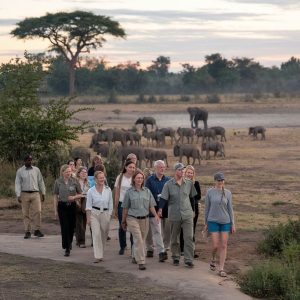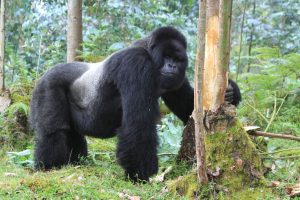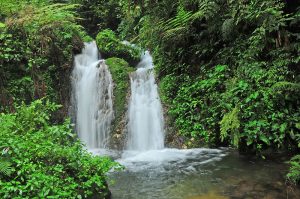What are camping safaris in Kenya?
Camping safaris in Kenya are wilderness experiences that allow travelers to stay in tents or mobile camps within or near national parks and reserves. Unlike lodge safaris, camping safaris bring visitors closer to nature by sleeping under the stars, surrounded by the sights and sounds of wildlife. They offer a range of options, from budget-friendly basic camping with simple facilities to luxurious tented camps equipped with modern comforts. Camping safaris in Kenya combine adventure, affordability, and direct interaction with the natural environment, making them a popular choice among local and international tourists.
Why should you choose a camping safari in Kenya?
A camping safari in Kenya is an excellent way to experience the country’s famous landscapes and wildlife in an authentic and adventurous way. Kenya is home to diverse ecosystems, from the savannahs of the Maasai Mara to the deserts of Samburu and the forests of Aberdare. Camping provides an opportunity to immerse yourself in these environments more deeply than traditional lodge stays. It is also cost-effective, making it suitable for travelers with different budgets. For those seeking adventure, camping safaris provide the thrill of living close to wildlife while still following safety protocols managed by guides and park authorities.
Which national parks and reserves in Kenya offer camping safaris?
Kenya’s national parks and reserves provide a wide variety of camping safari opportunities. Maasai Mara National Reserve is the most famous, offering camping experiences alongside the annual wildebeest migration. Amboseli National Park allows camping with breathtaking views of Mount Kilimanjaro. Tsavo East and Tsavo West National Parks provide vast wilderness areas for camping and wildlife spotting. Samburu National Reserve offers camping in a semi-arid environment with unique wildlife such as Grevy’s zebras and reticulated giraffes. Other destinations include Lake Naivasha, Aberdare National Park, and Meru National Park, all of which offer designated campsites for visitors.
What types of camping safaris are available in Kenya?
Kenya offers three main types of camping safaris. Basic camping involves using public campsites with simple facilities, requiring travelers to bring or rent their own tents and equipment. Mid-range camping safaris often use mobile camps managed by tour operators, providing tents, bedding, and meals. Luxury camping, also known as glamping, offers high-end tents with en-suite bathrooms, fine dining, and professional guides, combining comfort with adventure. This range allows tourists to choose based on their budget, preferences, and desired level of comfort.
What wildlife can you see during camping safaris in Kenya?
Camping safaris in Kenya provide access to some of the most diverse wildlife in Africa. In the Maasai Mara, campers can witness the Big Five—lions, elephants, leopards, rhinos, and buffaloes—alongside cheetahs, zebras, and wildebeests. Amboseli National Park offers large elephant herds with Kilimanjaro as a backdrop. Tsavo is known for its red elephants and predators such as lions and leopards. Samburu provides sightings of unique species like Somali ostriches and gerenuks. Birdwatching is excellent across all parks, with more than 1,000 bird species recorded in Kenya.
How safe are camping safaris in Kenya?
Camping safaris in Kenya are safe when conducted in designated areas under the guidance of licensed tour operators and park authorities. Campsites are usually protected by rangers, and safety measures are in place to minimize risks from wildlife. Visitors are advised not to wander alone at night, avoid leaving food exposed, and follow all instructions from guides and rangers. Professional safari companies provide trained staff who ensure security while maintaining respect for wildlife and the environment.
What facilities are available at campsites in Kenya?
Campsites in Kenya vary in terms of facilities. Public campsites offer basic amenities such as pit latrines, water access, and open spaces for tents. Private campsites and luxury tented camps provide more advanced facilities, including showers, flush toilets, dining areas, and sometimes electricity. In luxury camping, facilities include en-suite bathrooms, comfortable bedding, and dining tents. Regardless of the type, all campsites maintain basic necessities for a safe and comfortable stay in the wilderness.
What is the cost of camping safaris in Kenya?
The cost of camping safaris in Kenya depends on the type of camping and services offered. Basic camping may cost between $30 and $100 per night, excluding park entry fees. Mid-range mobile camping safaris range between $150 and $300 per person per night. Luxury glamping safaris can exceed $400 per person per night, offering premium services. Park entry fees, which vary by park, are additional and must be factored into the total cost. Tour operators often provide packages that cover transportation, meals, equipment, and guiding services.
When is the best time for camping safaris in Kenya?
The best time for camping safaris in Kenya is during the dry seasons from June to October and December to February. These periods provide favorable weather, less muddy trails, and increased chances of seeing wildlife around waterholes. The dry season in July to October coincides with the wildebeest migration in Maasai Mara, making it particularly popular. Camping is possible year-round, but the rainy seasons (March to May and November) can present challenges such as slippery conditions, heavy rains, and more insects.
What permits do you need for camping safaris in Kenya?
Camping itself does not require a special permit, but visitors must pay entry fees to access Kenya’s national parks and reserves. These fees are set by the Kenya Wildlife Service (KWS) or local county authorities. Some campsites may also require a separate camping fee. Special activities such as night game drives, hiking in protected areas, or visits to private conservancies may require additional permits. Travelers should confirm specific requirements with park authorities or licensed tour operators before their safari.
What should you pack for a camping safari in Kenya?
Packing properly is essential for a successful camping safari in Kenya. Essential items include a quality tent, sleeping bag, sturdy walking shoes, insect repellent, sunscreen, and layered clothing suitable for hot days and cool nights. A flashlight, reusable water bottle, and personal first aid kit are recommended. Binoculars and cameras are useful for wildlife viewing. During the rainy season, waterproof gear is essential. For luxury camping safaris, most equipment and supplies are provided by the operators.
Can you combine camping safaris with other activities in Kenya?
Camping safaris in Kenya can easily be combined with other activities. In Maasai Mara, visitors can combine camping with hot air balloon safaris. At Amboseli, photography safaris are popular due to the iconic views of Kilimanjaro. In Tsavo, visitors can combine camping with guided hikes and cultural visits. Lake Naivasha offers boat rides and birdwatching alongside camping. Cultural experiences with Maasai communities are often included in camping itineraries, enriching the safari experience.
How do camping safaris compare with lodge safaris in Kenya?
Camping safaris and lodge safaris in Kenya offer different experiences. Camping safaris are more adventurous and affordable, providing closer contact with the wilderness. Lodge safaris, on the other hand, offer more comfort, modern facilities, and convenience. While lodges provide an easier stay, camping provides a more immersive experience, where visitors hear animals at night and enjoy the serenity of the natural environment. The choice depends on budget, comfort preference, and desired adventure level.
Are there luxury camping or glamping options in Kenya?
Yes, Kenya offers luxury camping, often referred to as glamping. These experiences provide the thrill of camping while offering high-end facilities such as en-suite bathrooms, fine dining, and spacious tents with modern furnishings. Glamping is available in popular destinations such as Maasai Mara, Amboseli, and private conservancies. These options are ideal for travelers seeking both adventure and comfort in Kenya’s wilderness.
What rules and guidelines should campers follow in Kenya’s national parks?
Visitors must follow strict rules when camping in Kenya’s national parks and reserves. These include maintaining a safe distance from wildlife, not feeding animals, disposing of waste responsibly, and avoiding excessive noise. Fires should only be lit in designated areas, and campers must adhere to the instructions of guides and rangers at all times. Respecting these guidelines ensures both visitor safety and the conservation of Kenya’s natural resources.
Are guided camping safaris available in Kenya?
Yes, guided camping safaris are widely available in Kenya. Licensed tour operators provide experienced guides who manage the logistics, set up camp, prepare meals, and ensure safety. Guided camping safaris enhance the experience by offering professional wildlife interpretation and cultural insights. They are particularly suitable for first-time campers or those seeking an organized experience.
Can families and children go on camping safaris in Kenya?
Camping safaris in Kenya are suitable for families and children, particularly in family-friendly campsites. Some camps provide larger tents, family-oriented activities, and guided nature walks suitable for children. However, certain activities such as walking safaris may have age restrictions for safety reasons. Families can particularly enjoy camping in Amboseli, Lake Naivasha, and private conservancies where child-friendly programs are available.
What cultural experiences can you combine with camping safaris in Kenya?
Camping safaris in Kenya often integrate cultural experiences, especially in Maasai and Samburu regions. Visitors can participate in cultural village tours, traditional dances, and storytelling sessions. Some itineraries include visits to local markets or craft centers. These cultural encounters provide insights into Kenya’s traditions, complementing the wildlife-focused camping safari experience.
How do you prepare for a camping safari in Kenya?
Preparation for a camping safari in Kenya involves booking with a reliable tour operator, confirming park entry requirements, and ensuring necessary vaccinations and health precautions. Travelers should pack appropriate gear, budget for park fees, and prepare physically for any hiking or walking activities. Researching weather conditions for the specific season helps in packing correctly. Proper preparation ensures safety, comfort, and a more enjoyable camping safari.
Which tour operators offer camping safaris in Kenya?
Numerous licensed tour operators in Kenya offer camping safaris, ranging from budget to luxury packages. Reputable operators are registered with the Kenya Association of Tour Operators (KATO) and work with Kenya Wildlife Service for park access. These operators provide guided camping experiences, equipment, transportation, and meals. Many offer tailor-made itineraries that combine camping with game drives, cultural visits, and other safari activities.




